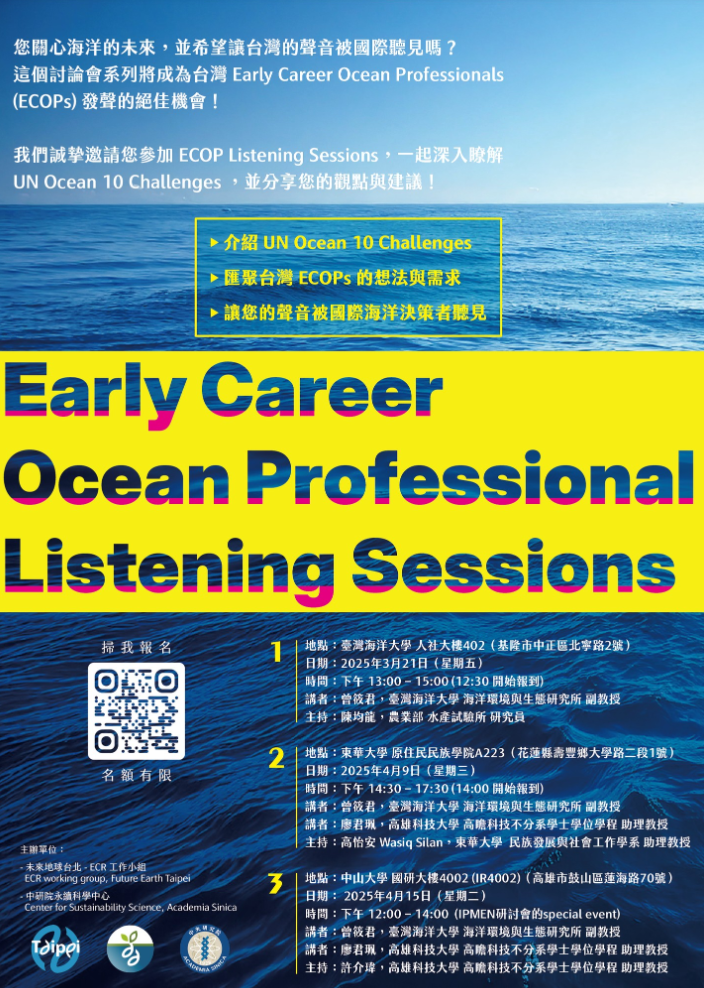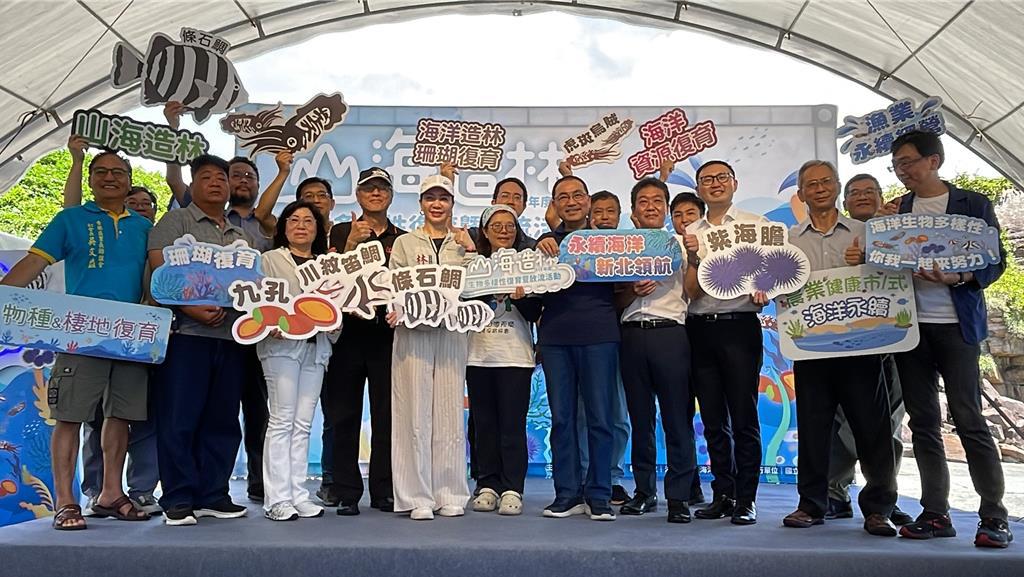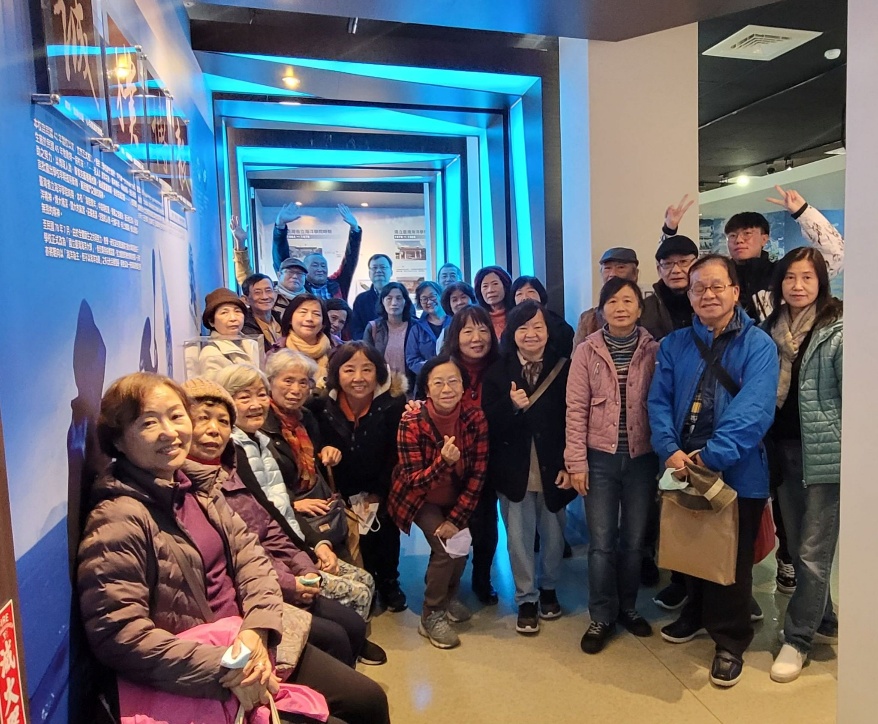14.5.4
1. Early Career Ocean Professional (ECOP) Listening Sessions
早期職業海洋專業人士 (ECOP)聆聽工作坊
The listening sessions revealed that youth from diverse backgrounds in Taiwan—ECOPs, Indigenous youths, and young Ocean Educators—share strong concerns about marine pollution and ecosystem degradation. Across all groups, ‘Challenge 1: Understand and beat marine pollution' and ‘Challenge 2: Protect and restore ecosystems and biodiversity' were consistently ranked among the top three priorities. While the third priority varied, each group brought unique perspectives shaped by their experiences and professional or cultural contexts. All participants acknowledged that Taiwan has demonstrated significant strengths in marine ecosystem restoration and possesses the capacity to contribute valuable expertise and technology to global ocean sustainability. However, over 60% of ECOPs and Indigenous youth participants had never heard of the UN Ocean Decade, largely due to Taiwan's exclusion from formal UN processes. Despite Taiwan's fisheries and shipping sectors ranking among the top globally, it remains excluded from many international negotiations, resulting in a critical gap in global ocean data and perspectives. The participants called for more inclusive and culturally grounded ocean governance that integrates the knowledge and efforts of non-state actors, including Indigenous communities. Their collective messages urge that Taiwan's marine expertise and perspectives be meaningfully included in international dialogues—ensuring ocean sustainability efforts reflect diverse voices and local realities.
Sustainable Impact:This dialogue gathered Taiwanese youth from diverse backgrounds—environmental advocates, Indigenous leaders, and marine educators—to discuss ocean pollution, ecosystem degradation, and inclusive governance. Participants recognized Taiwan's strong technical capacity in marine ecosystem restoration but highlighted its exclusion from UN Ocean Decade processes, resulting in significant data and representation gaps. Over 60% of attendees had never heard of the UN Ocean Decade, underscoring the need for greater international engagement. The forum called for culturally grounded and inclusive ocean governance that integrates Indigenous knowledge and non-state actors' expertise. It emphasized Taiwan's potential contribution to global marine sustainability through science, education, and policy innovation. This initiative aligns with SDG 14 (Life Below Water), promoting conservation and sustainable management of ocean resources; SDG 17 (Partnerships for the Goals), strengthening global collaboration; and SDG 4.3.5, enhancing educational awareness and professional capacity for sustainable ocean action.
聆聽環節發現,來自不同背景的台灣青年——環保青年、原住民青年和青年海洋教育者——都對海洋污染和生態系統退化有著強烈的擔憂。在所有群體中,「挑戰一:了解並戰勝海洋污染」和「挑戰二:保護和修復生態系統與生物多樣性」始終位列三大優先事項之列。雖然第三個優先事項各不相同,但每個群體都根據自身的經驗、專業或文化背景提出了獨特的觀點。所有參與者都承認,台灣在海洋生態系統修復方面展現出顯著優勢,有能力為全球海洋永續發展貢獻寶貴的專業知識和技術。然而,超過 60% 的環保青年和原住民青年參與者從未聽說過聯合國海洋十年,主要是因為台灣被排除在聯合國正式進程之外。儘管台灣的漁業和航運業在全球名列前茅,但它仍然被排除在許多國際談判之外,導致全球海洋數據和觀點有重大缺口。與會者呼籲更具包容性、以文化為基礎的海洋治理,整合包括原住民社群在內的非國家行為體的知識和努力。他們共同呼籲,將台灣的海洋專業知識和觀點有效納入國際對話,確保海洋永續發展努力反映多元聲音和本土現實。
永續影響力:本活動匯集來自不同背景的台灣青年,包括環保青年、原住民青年及海洋教育者,共同探討海洋污染、生態系退化及多元文化參與等議題。與會者一致認為,台灣在海洋生態修復上具備專業能力與技術優勢,應積極參與全球海洋治理。然而,超過六成的青年未曾聽聞「聯合國海洋十年」,顯示台灣在國際海洋永續進程中被邊緣化的困境。與會者呼籲建立更具包容性的國際對話平台,納入原住民與非國家行為者的知識與經驗,並促進海洋教育與文化治理的融合。此舉不僅推動跨文化合作與教育提升,也體現SDG 14「海洋生態永續」、SDG 17「夥伴關係」、及SDG 4.3.5「教育與專業能力增能」之核心精神。

Evidence:
https://www.facebook.com/photo.php?fbid=691210616572785&id=100070515593897&set=a.220356423658209
2. Aquatic Biology Research and Conservation Center Promotes Marine Stock Enhancement and Conservation along Taiwan's North Coast
本中心「水生生物研究暨保育中心」推動北海岸水產生物增殖放流保育
The Aquatic Biology Research and Conservation Center, under the Center of Excellence for the Oceans, National Taiwan Ocean University (NTOU), has made remarkable contributions in recent years to marine ecological restoration and sustainable resource management.Since 2014, the Center has collaborated with the New Taipei City Government to establish Taiwan's first Demonstration Area for Cultivated Fisheries in Mao'ao, Gongliao. Through advanced artificial breeding techniques, the Center has successfully achieved full-cycle aquaculture for key northern Taiwan marine species such as the mitten squid (Sepioteuthis lessoniana) and the three-spot swimming crab (Portunus sanguinolentus) — from mating and spawning to adult stages — and has continuously carried out large-scale seedling releases to promote sustainable fisheries development. In cooperation with the New Taipei City Government, the Center also launched the “Sustainable Ocean Action and Scientific Resource Restoration” project, representing Taiwan's only marine restoration model jointly led by a local government and a university. This initiative integrates academic research with practical marine conservation efforts. In 2024, the Aquatic Biology Research and Conservation Center incorporated key themes such as resource restoration, circular agriculture, and net-zero carbon emissions, achieving diverse and innovative outcomes. In sea urchin and abalone cultivation, locally produced macroalgae (such as Gracilaria tenuistipitata and Grateloupia filicina) were used as feed to reduce costs and carbon emissions. During the intermediate rearing of fish larvae and the cultivation of crabs and squid, algae including Gracilaria, Chaetomorpha, and Ulva were used to provide shelter and spawning substrates while also improving water quality and supplying natural feed. At the Meiyan Mountain Intermediate Rearing Base, after four years of habitat construction, various artificial substrates have successfully supported the growth of multiple natural macroalgal species. This project also pioneered the use of environmental DNA (eDNA) and metabarcoding techniques to verify the presence of macroalgal spores and filaments on substrates and compare them with actual field observations. Furthermore, these techniques were applied to the species composition analysis of fish paste products in Taiwan, with results published in an international journal revealing that many commercial products contain multiple shark species. In abalone (Haliotis diversicolor) genetic resource management, the Center completed analyses of both released and commercial strains, establishing a scientific foundation for future breeding and restoration programs. In the purple sea urchin (Anthocidaris crassispina) restoration project, 6,000 juvenile urchins were successfully bred and released, with ongoing experiments using agricultural by-products as feed. Additionally, the Center continues to cultivate and release high-value species such as the barred knifejaw (Oplegnathus fasciatus). Moreover, Dr. Te-Hua Hsu, Director of the Aquatic Biology Research and Conservation Center, received the 2024 Taiwan Sustainable Action Award – Outstanding Young Sustainability Leader, recognizing his long-term dedication to marine restoration and sustainable fisheries development. His achievement brings great honor to the Center and highlights NTOU's leadership in advancing marine sustainability in Taiwan.
Sustainable Impact:NTOU's Aquatic Biology Research and Conservation Center, in collaboration with the New Taipei City Government, established Taiwan's first "Aozih Bay Mariculture Demonstration Zone." The center successfully cultivated key species such as cuttlefish and crabs using artificial breeding and integrated macroalgae farming to reduce feed costs and carbon emissions. Advanced technologies like environmental DNA and metabarcoding were applied to monitor macroalgae and identify fish components in surimi products, linking scientific research to practical conservation. These efforts foster sustainable fisheries, habitat restoration, and ecosystem resilience, aligning with SDG 14.3.3 (marine science innovation), 14.5.4 (ecosystem restoration), and 14.5.5 (science-based marine management). The initiative exemplifies how academia drives marine sustainability through applied research, cross-sector collaboration, and ecological restoration.
國立臺灣海洋大學海洋中心轄下之「水生生物研究暨保育中心」,近年來在海洋生態復育與海洋資源管理方面展現卓越成果與具體貢獻。自2014年起與新北市政府合作,以貢寮卯澳為示範基地,建立全國首個「卯澳栽培漁業示範區」。透過人工繁養技術,成功完成北部地區具代表性海產虎斑烏賊(花枝)及鏽斑蟳(花蟹)等物種的養殖,從交配產卵至成體繁殖,並持續進行大量幼苗放流,推動永續漁業發展。本中心與新北市政府共同推動「貢寮水生中心—永續海洋行動與科學資源復育」計畫,建立全國唯一由地方政府與大學共同主導、結合學術研究與實務操作的海洋資源復育模式。2024年「水生生物研究暨保育中心」結合資源復育、循環農業及淨零碳排等議題,展現多元且具創新性的成果。於海膽與九孔養殖中導入自產大型藻類(如龍鬚菜、海木耳)作為飼料,降低飼料成本並有效減碳;在魚苗育成及花蟹、烏賊培育過程中,結合龍鬚菜、硬毛藻及滸苔等藻類,不僅提供生物棲息與產卵空間,同時發揮淨水與餌料供應功能。在美豔山中間育成基地,經四年棲地營造,人工吊掛附著基已成功培育多種天然大藻。本期計畫首度導入環境DNA與元條碼技術,驗證附著基上大藻孢子與絲狀體的存在,並與實際觀察大藻進行比對。同時,該技術亦應用於台灣魚漿製品魚種組成分析,研究結果發表於國際期刊,揭示多數魚漿製品含有多種鯊魚成分。在九孔種原管理方面,完成放流資源培育及商業品系分析,為後續育種與復育提供科學依據;於紫海膽復育放流計畫中,成功培育並放流6,000顆稚膽,並持續以農業副產物開發餌料來源;同時持續推動高經濟價值魚種如條石鯛之培育與放流工作。此外,貢寮水生中心負責人徐德華博士因長期投入海洋復育及永續漁業推廣,榮獲「2024年臺灣永續行動獎-臺灣傑出永續青年獎」,肯定其對國家海洋永續發展的卓越貢獻,也為本中心的努力增添榮耀。
永續影響力: 海洋中心「水生生物研究暨保育中心」與新北市政府合作,建構「卯澳栽培漁業示範區」,以人工繁養技術成功復育虎斑烏賊與鏽斑蟳等經濟物種,並導入大型藻類養殖以降低碳排與成本。中心首度應用環境DNA與元條碼技術於大藻監測與魚漿魚種分析,實現科研與永續治理結合。此計畫促進棲地復育、漁業永續及生態平衡,符合 SDG 14.3.3(推動海洋科學研究)、14.5.4(保育與復育沿岸生態系)、14.5.5(以科學依據支援海洋資源管理),展現大學在永續海洋發展中的關鍵角色。


Evidence:
https://www.ctee.com.tw/news/20240720700514-431401
3. Senior Citizens Learning Camp
樂齡大學
The Senior Citizens Learning Camp is committed to promoting healthy aging and lifelong learning, enabling seniors to learn and grow in a high-quality campus environment. By combining university faculty, teaching facilities, and diverse courses at affordable costs, the program provides high-quality educational content that promotes active aging and lifelong learning practices. Elderly students can learn and interact with young students, expanding interpersonal connections and intergenerational understanding while opening new life perspectives. For elderly students who were unable to attend university in their youth, the Senior Citizens Learning Camp provides an opportunity to return to campus, achieving educational equity and inclusive learning. The curriculum emphasizes health promotion and practical life applications, covering topics such as hygiene and safety, balanced nutrition, medication safety, exercise and wellness, and mental health. These courses help seniors establish healthy lifestyles. Courses such as "Medication Safety and Health Preservation for Seniors" and "Practical Acupressure and Health Maintenance" all aim to promote physical and mental health and delay aging. The university also promotes student volunteer services and community partnerships, disseminating concepts of hygiene, nutrition, exercise, and healthy aging through health lectures and service activities. Furthermore, the curriculum design integrates sustainable development and environmental education, including topics such as "Sustainable Development: Protecting Environment and Health" and "Wetland Ecology." These courses help students understand the risks, impacts, mitigation strategies, and adaptation measures related to climate change. Through classroom discussions and field learning, the program strengthens awareness of environmental protection and green living, encouraging seniors to practice energy conservation, carbon reduction, and resource recycling in their daily lives, thereby advancing climate action education. Through wetland visits and coastal conservation learning, the program promotes seniors' understanding and protection of marine and aquatic ecosystems. By fostering community co-learning and action, the program cultivates students' civic awareness and sense of responsibility for ecological conservation, working together to protect sustainable aquatic environments.
Sustainable Impact: The Senior Learning University of National Taiwan Ocean University embodies the principle of “Education for all ages, learning without end,” integrating health promotion, environmental sustainability, and community engagement. Its curriculum covers physical wellness, nutrition, mental health, sustainable development, and climate action, while incorporating marine and wetland ecological education to raise awareness of environmental protection and ocean conservation.
Through courses such as Safe Medication Use for Seniors and Sustainable Development and Environmental Health, participants gain knowledge that promotes healthy aging and ecological responsibility. The program also provides open access to university resources—including classrooms, libraries, and sports facilities—enhancing inclusivity and lifelong learning opportunities.
This initiative aligns with SDG 13.3.1, 14.5.4, 3.3.2, 4.3.2, demonstrating how higher education can promote intergenerational learning, sustainable living, and environmental stewardship within local communities.
樂齡大學以教育為核心,串聯健康促進、環境永續與社區參與三大面向,實現「教育不分年齡、學習永不止息」的理念。透過多元課程與外展服務,促進高齡者健康老化、知識增能與社會連結。 藉由樂齡大學向社區開放教育資源,包含圖書館、電腦設備、教室、體育館、游泳池,提供社區民眾持續學習的機會。藉由樂齡大學計畫,促進教育資源共享與社區的共享,提升長者的學習權益、生活品質及社會參與度,促進教育普及與終身學習精神。 樂齡大學致力於推動健康老化與終身學習,讓長者能在優質的校園環境中學習與成長。透過結合大學師資、教學設備與多元課程,以親民的費用提供高品質教育內容,促進「活躍老化」與終身學習的實踐。學員能與年輕學生共同學習、交流,拓展人際互動與跨世代理解,同時開啟不同的人生視野。對年輕時未能進入大學的長者而言,樂齡大學提供重返校園的機會,實現教育公平與包容性學習。 課程強調健康促進與生活實用性,內容涵蓋衛生安全、營養均衡、用藥安全、運動保健與心理健康,協助長者建立健康生活型態。課程如「銀髮族用藥安全與養生保健須知」、「筋絡實用按摩保健」等,皆以促進身心健康與延緩老化為目標。學校亦推動學生志願服務與社區合作,透過健康講座與服務活動推廣衛生、營養、運動與健康老化理念。 此外,課程設計融入永續發展與環境教育,內容包括「永續發展保護環境與健康」、「海岸濕地生態」等,協助學員了解氣候變遷的風險、影響、減緩與調適策略。透過課堂討論與實地學習,強化環境保護與綠色生活意識,鼓勵長者於日常生活中實踐節能減碳與資源循環,推動氣候行動教育。並透過濕地參訪與海岸保育學習,促進長者對海洋與水域生態系統的了解與維護。藉由社區共學與行動,培養學員生態保育的公民意識與責任感,共同守護永續的水域環境。
永續影響力:國立臺灣海洋大學樂齡大學以「教育不分年齡、學習永不止息」為理念,結合健康促進、環境永續與社區共學三大主軸。課程涵蓋養生保健、心理健康、永續發展與氣候行動等主題,並融入海洋與濕地生態教育,提升長者對氣候變遷與環境保育的理解。校方開放校園設施與資源,促進教育公平與跨世代共學。此計畫符合 SDG13.3.1, 14.5.4, 3.3.2, 4.3.2精神,兼具健康老化、教育普及、氣候行動與海洋素養推廣意涵,展現大學在終身教育與永續社會實踐的角色。


Evidence: